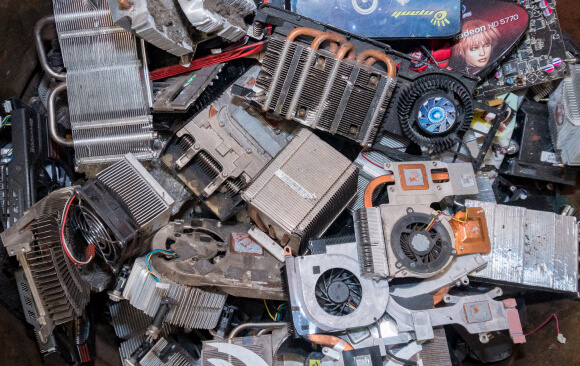
Types of E-Waste We Recycle
We provide efficient e-waste recycling services for all common types of e-waste, including:
- Computers and peripherals
- Mobile phones
- TVs and monitors
- Printers and scanners
- Small household appliances
- White goods
- Audio and video equipment
- Power tools and electronic toys
- Batteries
- Cables and chargers
- More
Pick-Up Fees
If you cannot deliver your scrap to our scrap yard, we also offer a pick-up service.
Below are our current pick-up fees, which include GST, reflecting the necessary care and procedures required:
- Per Pallet: $82.50. This rate applies to materials that fit within a standard pallet size and covers the necessary processing and recycling procedures.
- Over 2 Tons: $192.50. This fee is for larger loads exceeding 2 tons, suitable for businesses and extensive recycling projects.
- Special Handling Materials: Certain items require additional care due to hazardous components or specific handling needs. Fees for these materials are necessary to ensure safe and responsible recycling, adhering to environmental regulations.
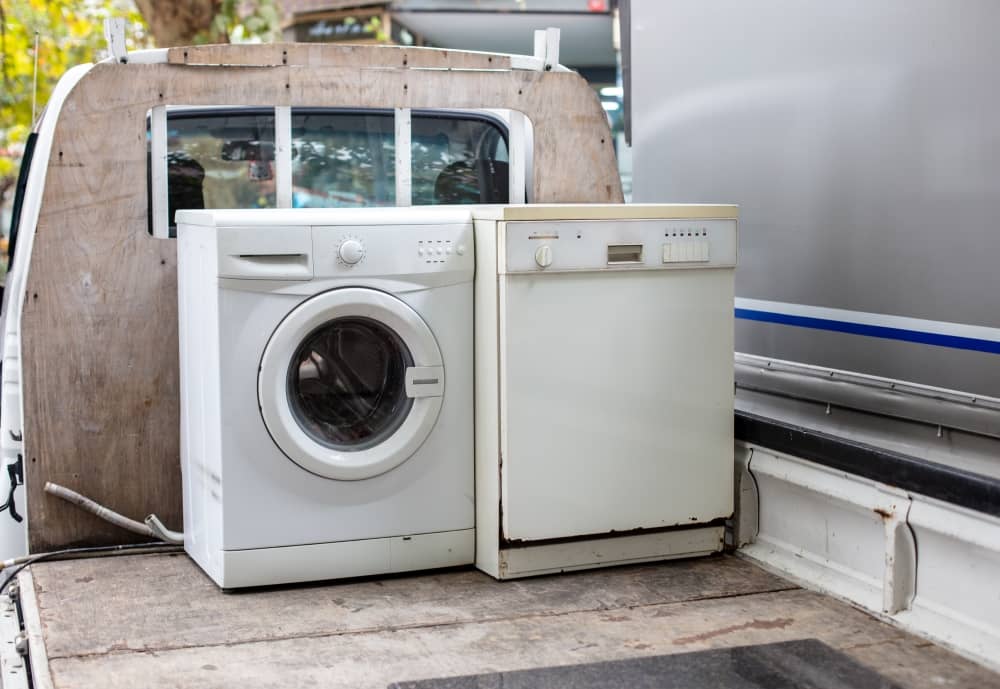
How to Recycle Your E-Waste
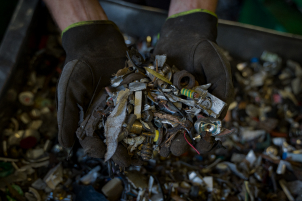
1. Gather your e-waste
This is an excellent way to empty your garage or shed while getting reimbursed for your e-waste. Remember to separate your e-waste by category and research how to do this safely.
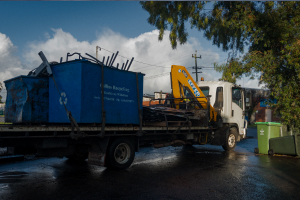
2. Book collection or disposal
Depending on your preference, we can arrange to pick up e-waste from your home or business location. You can also drop off your recyclable e-waste at our scrap yard in Perth. Just be sure to have your waste organised before we arrive and we’ll do the rest.
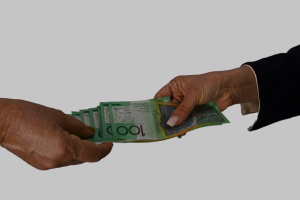
3. Get reimbursed
All materials are recycled responsibly and go direct to Australian-approved smelters around the world. There is no other third party, and no recycling goes to landfill. Plus, we reimburse you for your scrap.
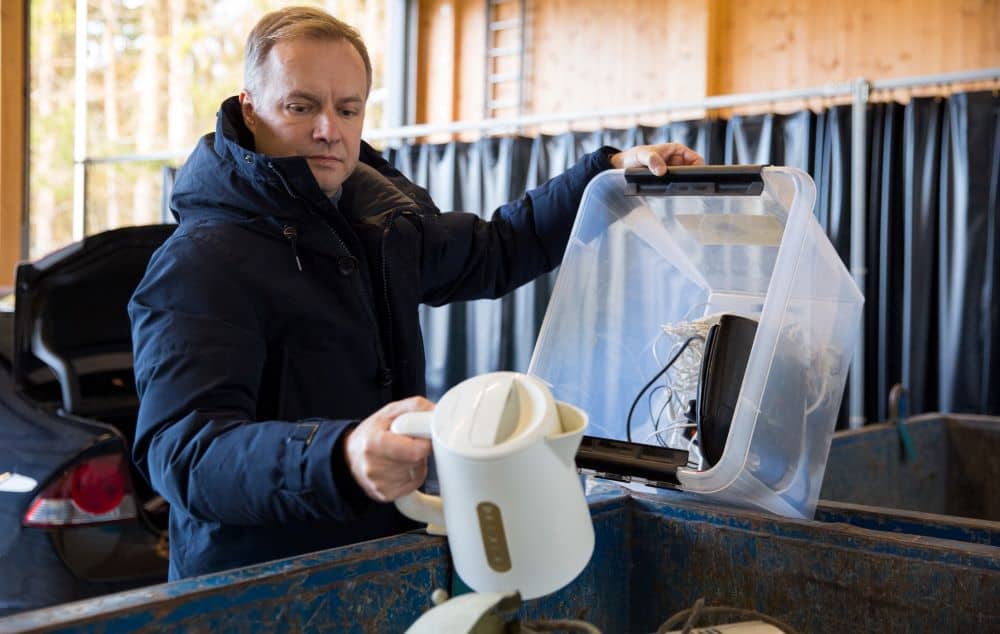
How to Prepare Your E-Waste
Before you bring your electronic waste to our scrap yard or arrange for us to pick it up, it’s crucial to prepare your items properly to ensure safety and compliance with legal requirements.
Here’s how you can prepare different types of e-waste:
- Printer Toners and Batteries: These items need special attention. Please remove all printer toners and separate any batteries from the devices. This helps in preventing contamination and facilitates the recycling process.
- Air Conditioners: By law, air conditioners must be degassed before they can be collected or dropped off. This task should be performed by a certified technician to ensure it is done safely and in accordance with environmental regulations.
- Lithium Batteries: Given their reactive nature, lithium batteries should be handled with extra care:
- Use Anti-Static Bags: Place the batteries in anti-static bags to prevent any electrical discharges.
- Store Safely: Keep the batteries in a cool, dry place away from any sources of heat or ignition to reduce the risk of fire.
- Tape Off Connectors: Cover any exposed connectors with tape to prevent shorts and other electrical hazards.
Benefits of Recycling E-Waste
There are many benefits of recycling your e-waste, including:
- Conserving natural resources
- Reducing environmental pollution
- Saving energy
- Mitigating climate change
- Protecting public health
- Creating jobs
- Supporting non-renewable resource conservation
- Encouraging sustainable production and consumption
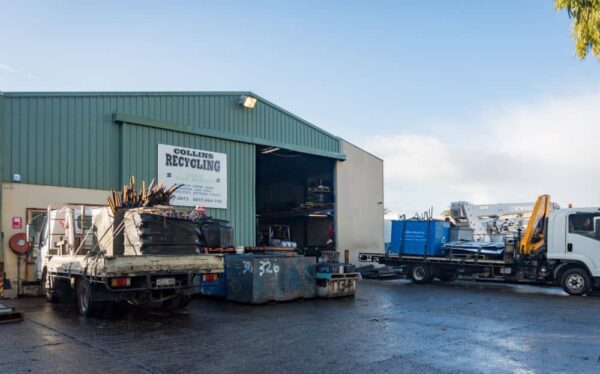
Testimonials
Very positive interaction with Dave who was very knowledgeable about the recycling processes and gave me confidence that each material would be recycled effectively. 100 percent would recommend.
– Jony
Big thank you to Dave and his team. We found Dave to be very kind and helpful also very patient answering numerous questions re recycling the different metals and what to do to get the best price. Nice to deal with someone straight up and honest and happy to help. Nice team of helpful, extremely strong guys. Also the sweet young lady in the office.
– Maryanne
David is very friendly and helpful, he even gave me advice on helping break apart my scrap further to get the best price. Would highly recommend!
– Corey
I don’t usually post reviews but I needed to this time, it’s so hard to find a scrap yard that recycles E-Waste and doesn’t have all the hidden fees, would highly recommend to anyone looking to dispose of their E-Waste and know it’s not going to the tip behind the scenes.
– Jarrod
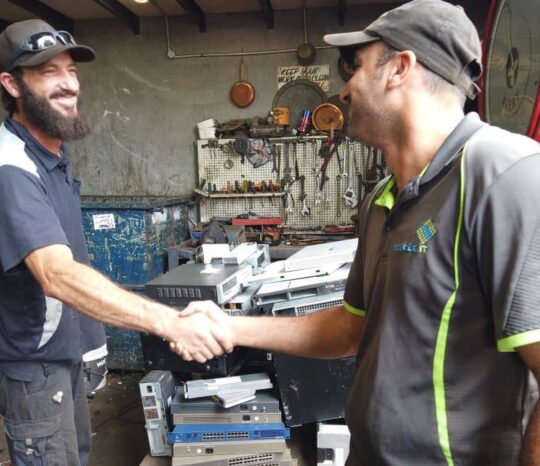
Why Choose Us?
Emphasising sustainability, we ensure that we stay up-to-date with the latest practices and only work with efficient and responsible recycling teams, making us one of the leading e-waste recycling teams in Perth.
We’re dedicated to diverting as much electronic waste from landfill and export as possible.
As a family-run, Australian-owned scrap yard, our main priority is our customers, which is why we provide the best customer service possible.
FAQs
What is e-waste?
The term ‘e-waste’ encompasses all old electrical appliances either in a state of disrepair or simply obsolete. E-waste recycling includes everything from fridges and microwaves to mobile phones and computers, and correct electronic waste disposal is of vital importance to being able to achieve a sustainable future.
Electronic waste, or e-waste, as everyone likes to call it, is anything that you don’t have use for that has a plug, battery, or cord. Unlike other types of rubbish, you typically cannot dispose of electrical recycling in your bin. Most items are potentially hazardous, while others still have value and certainly do not belong in a landfill. That is why it’s important to let our expert scrap metal recycling team handle this for you.
How is e-waste recycled?
After picking up your electrical recycling items, we’ll head to our electronic waste disposal centre to process and separate the elements.
Efficient separation is the key to the success of recycling e-waste.
Usually, e-waste is shredded and metals, taking apart valuable metals and other pieces.
Magnets are often utilised to separate steel and iron, which are later prepared as recycled steel, copper, circuit boards, and aluminium.
This scrap is then sold internationally to leading e-waste recycling businesses to ensure the process is up-to-date, efficient, and environmentally-friendly.
What are the most common types?
Some of the most common electronic waste disposal products include:
- Printers and fax machines
- Microwaves
- Video game consoles
- Mobile phones and digital cameras
- Computers, scanners, keyboards, and computer mice
- Power tools
- Batteries
- Television sets, DVD players, CD Players, and radios
- White goods
- Printer cartridges
It is worth noting that the vast majority of the parts used to make these products are recyclable. In fact, up to 98 per cent of the components in televisions and computers can be recycled.
Why is it a problem?
E-waste poses significant environmental and health risks due to the toxic substances it contains, such as lead, mercury, and cadmium. Improper disposal can lead to toxic materials seeping into soil and water, harming ecosystems and human health. Moreover, the loss of valuable materials like gold, silver, and copper that could be recycled exacerbates resource depletion.
How can reducing e-waste benefit the environment?
Reducing e-waste helps conserve natural resources, reduces pollution, and decreases greenhouse gas emissions from manufacturing new products. It also minimises the risks of environmental contamination from hazardous substances, contributing to a healthier planet.
Are there any regulations governing e-waste in Australia?
Yes, in Australia, e-waste management and recycling are governed by various state and federal regulations to ensure the responsible disposal of electronic waste and reduce its environmental impact.
The National Television and Computer Recycling Scheme (NTCRS) is a pivotal federal initiative that mandates manufacturers and importers of TVs, computers, and computer products to take responsibility for their products’ end-of-life, providing Australian residents with free recycling services for these items.
Additionally, many states and territories have specific regulations and programs aimed at managing other types of e-waste, encouraging recycling, and reducing landfill.
Enquire Now
Send us an email via the form below or get in touch over the phone at 9478 3973 to book your collection or ask about the value of your scrap.
